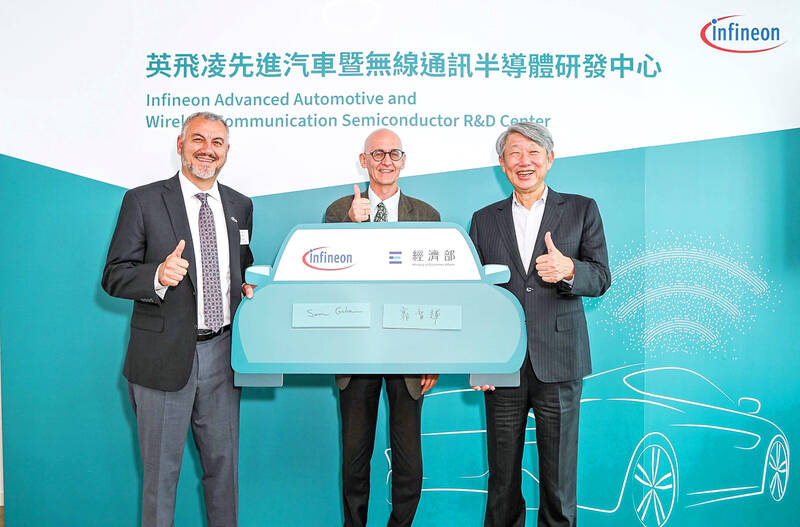Infineon Technologies AG, a world-leading automotive chip supplier, yesterday said it plans to set up a NT$1.2 billion (US$37.05 million) research and development (R&D) center in Taiwan with government funding of NT$480 million to develop next-generation Wi-Fi and Bluetooth chips for electric vehicles in collaboration with local partners.
Infineon is the latest among a slew of global semiconductor companies seeking to operate R&D centers in Taiwan given a resilient semiconductor ecosystem. Taiwan Semiconductor Manufacturing Co (TSMC, 台積電) makes advanced automotive chips for Infineon and NXP Semiconductors NV in Taiwan.
Under similar government initiatives, Nvidia Corp has set up its first artificial intelligence (AI) R&D center in Taiwan with total investment of NT$24.3 billion, including NT$6.7 billion in government subsidies, and is considering establishing a second one.

Photo courtesy of Infineon Technologies AG
Advanced Micro Devices Inc (AMD) is reportedly seeking government support to build a R&D center in Taiwan with total investment of NT$5 billion.
Infineon’s new investment is part of the “A+ Global Innovation Partnership Initiative Program,” an initiative launched by the Ministry of Economic Affairs to accelerate Taiwan’s development of cutting-edge technologies by leveraging the strength of global industry leaders.
Infineon alone would inject about NT$720 million to establish the “Infineon advanced automotive and wireless communication semiconductor R&D center,” upgrading its existing Wireless Communication R&D Lab in Taiwan.
The R&D center investment, the first among European automotive chip manufacturers, would create NT$60 billion in production value for local automotive electronics, Infineon said in a statement yesterday.
The project would cover the entire R&D process for Infineon’s next-generation, automotive-grade Bluetooth chip that is to be carried out in Taiwan, the statement said.
This includes the involvement of international automotive electronic R&D experts, facilitating exchanges with local researchers and industry clients, and transferring expertise in the automotive domain, the German chipmaker said.
The goal is to complete the entire development process of next-generation Bluetooth chip design in Taiwan, from chip design and production to chip packaging and testing, it said.
“We are impressed by Taiwan’s dynamic innovation ecosystem, including its highly skilled R&D talent and strong industry clusters. Building on our strong foundation of existing partnerships with many Taiwanese companies, Infineon now significantly increases its R&D activities. We look forward to further enriching and broadening our collaborative efforts with our local partners,” Sam Geha, executive vice president of Internet of Things, compute and wireless business at Infineon, said in the statement.
Infineon is to team up with research institutes and technology-savvy schools, including the Industrial Technology Research Institute (工研院), National Taiwan University, National Cheng Kung University and National Taipei University of Technology, as well as multiple Taiwanese network module manufacturers and automotive system developers.
The collaboration is to focus on developing wireless communication technologies such as Wi-Fi and Bluetooth chips and solutions for wireless battery management systems, next-generation smart cockpits, and smart car access systems.

TAKING STOCK: A Taiwanese cookware firm in Vietnam urged customers to assess inventory or place orders early so shipments can reach the US while tariffs are paused Taiwanese businesses in Vietnam are exploring alternatives after the White House imposed a 46 percent import duty on Vietnamese goods, following US President Donald Trump’s announcement of “reciprocal” tariffs on the US’ trading partners. Lo Shih-liang (羅世良), chairman of Brico Industry Co (裕茂工業), a Taiwanese company that manufactures cast iron cookware and stove components in Vietnam, said that more than 40 percent of his business was tied to the US market, describing the constant US policy shifts as an emotional roller coaster. “I work during the day and stay up all night watching the news. I’ve been following US news until 3am

UNCERTAINTY: Innolux activated a stringent supply chain management mechanism, as it did during the COVID-19 pandemic, to ensure optimal inventory levels for customers Flat-panel display makers AUO Corp (友達) and Innolux Corp (群創) yesterday said that about 12 to 20 percent of their display business is at risk of potential US tariffs and that they would relocate production or shipment destinations to mitigate the levies’ effects. US tariffs would have a direct impact of US$200 million on AUO’s revenue, company chairman Paul Peng (彭雙浪) told reporters on the sidelines of the Touch Taiwan trade show in Taipei yesterday. That would make up about 12 percent of the company’s overall revenue. To cope with the tariff uncertainty, AUO plans to allocate its production to manufacturing facilities in

Six years ago, LVMH’s billionaire CEO Bernard Arnault and US President Donald Trump cut the blue ribbon on a factory in rural Texas that would make designer handbags for Louis Vuitton, one of the world’s best-known luxury brands. However, since the high-profile opening, the factory has faced a host of problems limiting production, 11 former Louis Vuitton employees said. The site has consistently ranked among the worst-performing for Louis Vuitton globally, “significantly” underperforming other facilities, said three former Louis Vuitton workers and a senior industry source, who cited internal rankings shared with staff. The plant’s problems — which have not

COLLABORATION: Given Taiwan’s key position in global supply chains, the US firm is discussing strategies with local partners and clients to deal with global uncertainties Advanced Micro Devices Inc (AMD) yesterday said it is meeting with local ecosystem partners, including Taiwan Semiconductor Manufacturing Co (TSMC, 台積電), to discuss strategies, including long-term manufacturing, to navigate uncertainties such as US tariffs, as Taiwan occupies an important position in global supply chains. AMD chief executive officer Lisa Su (蘇姿丰) told reporters that Taiwan is an important part of the chip designer’s ecosystem and she is discussing with partners and customers in Taiwan to forge strong collaborations on different areas during this critical period. AMD has just become the first artificial-intelligence (AI) server chip customer of TSMC to utilize its advanced